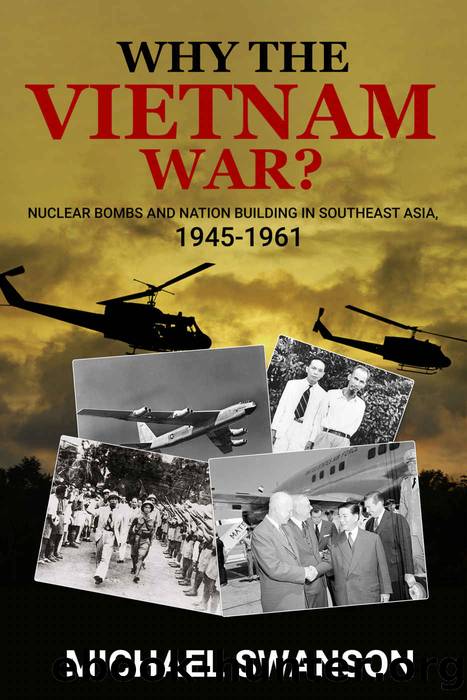Why The Vietnam War?: Nuclear Bombs and Nation Building in Southeast Asia, 1945-1961 by Michael Swanson

Author:Michael Swanson [Swanson, Michael]
Language: eng
Format: azw3, epub
Publisher: Campania Partners, LLC
Published: 2021-01-25T00:00:00+00:00
Chapter V - The Prize of Southeast Asia
Only a few weeks after John Kennedy became president, he organized a task force on Laos that included Walt Rostow, Assistant Secretary of State for the Far East J. Graham Parsons, who had been an ambassador to Laos for a few years during the Eisenhower administration, Dean Rusk, and Kennedy's new Assistant Secretary of Defense for International Security Affairs, Paul Nitze. Laos did not have a strong government and was home to several armed factions. Communist Pathet Lao forces allied with North Vietnam and China inside the country were making inroads.[169]
On March 20, 1961, Kennedy held a meeting with Rostow and his Laos advisers. Also present at the meeting were other men close to the President including McGeorge Bundy, Arthur Schlesinger, Jr., and Ted Sorenson. CIA Director Allen Dulles, Secretary of Defense Robert McNamara, and Admiral Arleigh Burke were also in attendance. So was Roger Hilsman who was serving as the Director of the Bureau of Research and Intelligence of the State Department. Rostow argued that the United States should send troops into neighboring Thailand where they could be stationed to be deployed into Laos at any moment.
His idea was not to engage in combat with these troops, but to use them as a potential bargaining chip. Rostow believed that they could deter the Pathet Lao and be used to force negotiations with them. Admiral Burke said that the Joint Chiefs opposed this idea. He said that they did not want to send troops to the mainland of Asia and predicted that if the President sent troops to Thailand that the Chinese or the North Vietnamese would simply pour troops into Laos to stiffen the Pathet Lao.
In Burke's view, that would mean a potential war with China. The only way they could win is if they sent 60,000 troops into Laos and backed them with air cover and even nuclear weapons. The way he saw it they should go all the way or stay out.
The Joint Chiefs did not want a repeat of what happened in Korea and did not want a massive land war in Asia to ever happen again. "Most students of international politics," Roger Hilsman later explained, "think of the Korean War as a success - an overt aggression was stopped and the Communists brought to discipline their ambitions by a limited use of force which confined the war and prevented its spiraling to engulf the whole world. But to many of the higher-ranking American military, the Korean War was a frustrating humiliation. The American army had been fought to a standstill by Asians, and by Asians whose arms and equipment were somewhat primitive by American standards. Air power, though freely used on the supply lines between the Yalu and the thirty-eight parallel, had not succeeded in stopping the flow of men and equipment. The significance to the military of the limitations and restrictions put on a wider use of force - principally, bombing China north of the Yalu - was probably as much a rationalization as a frustration.
Download
Why The Vietnam War?: Nuclear Bombs and Nation Building in Southeast Asia, 1945-1961 by Michael Swanson.epub
This site does not store any files on its server. We only index and link to content provided by other sites. Please contact the content providers to delete copyright contents if any and email us, we'll remove relevant links or contents immediately.
The Radium Girls by Kate Moore(12018)
100 Deadly Skills by Clint Emerson(4921)
Rise and Kill First by Ronen Bergman(4780)
The Templars by Dan Jones(4682)
The Doomsday Machine by Daniel Ellsberg(4484)
The Rape of Nanking by Iris Chang(4203)
Killing England by Bill O'Reilly(3996)
Stalin by Stephen Kotkin(3957)
Hitler in Los Angeles by Steven J. Ross(3942)
12 Strong by Doug Stanton(3541)
Hitler's Monsters by Eric Kurlander(3329)
Blood and Sand by Alex Von Tunzelmann(3195)
The Code Book by Simon Singh(3180)
Darkest Hour by Anthony McCarten(3119)
The Art of War Visualized by Jessica Hagy(3001)
Hitler's Flying Saucers: A Guide to German Flying Discs of the Second World War by Stevens Henry(2752)
Babylon's Ark by Lawrence Anthony(2673)
The Second World Wars by Victor Davis Hanson(2521)
Tobruk by Peter Fitzsimons(2509)
